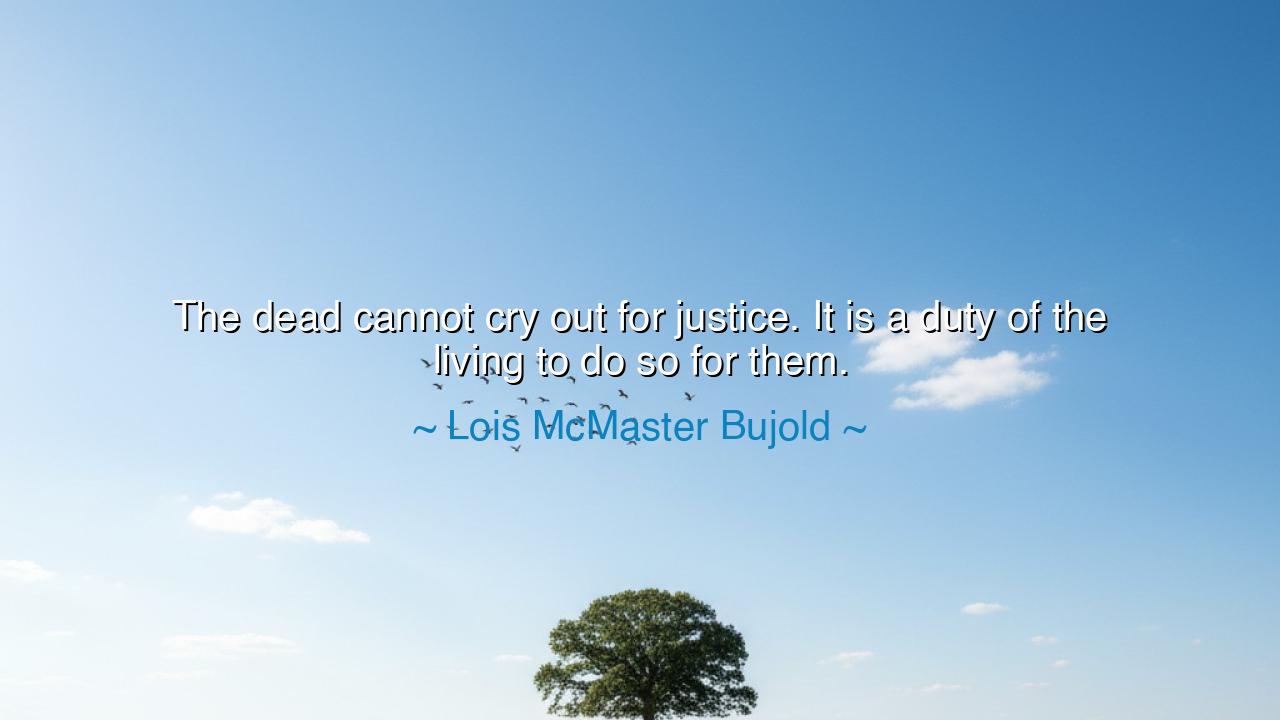
The dead cannot cry out for justice. It is a duty of the living






Hear, O child of the fleeting dawn, the solemn and enduring words of Lois McMaster Bujold, who declared: “The dead cannot cry out for justice. It is a duty of the living to do so for them.” In this saying resounds an ancient truth — that those who have fallen silent through death depend upon the courage of those who remain. Justice, she tells us, is not the birthright of the living alone; it is the inheritance of all souls, both present and departed. The dead, robbed of voice and defense, entrust to us the sacred burden of remembrance and redress. It is our task to speak where they cannot, to act where they no longer may.
Lois McMaster Bujold, a master of speculative fiction, wove her wisdom through the tapestry of imagined worlds, yet her insight pierces into the heart of our own. She wrote often of duty, honor, and the fragile bond that binds one soul to another. In these words, she gives voice to a moral law older than any nation: that the living must stand as guardians of truth, protectors of the memory of those who can no longer defend their name or their cause. In every age, injustice silences its victims — through cruelty, through neglect, through the slow erasure of history. But as long as one heart remains awake to righteousness, the silence of the dead is not final.
The ancients understood this well. When the Greeks buried their warriors, they built monuments not merely to honor their valor, but to swear an oath before the gods that their sacrifice would not be forgotten. In the Iliad, Achilles avenged the fallen Patroclus, not from vengeance alone, but from an unspoken duty — that the dead must not lie dishonored. To forget them, to leave their grievances unanswered, was to deny the sacred order of life itself. And so it has always been: the measure of a people’s virtue lies not only in how they treat the living, but in how they remember and defend the dead.
Consider the story of Emmett Till, a boy murdered in the heart of injustice. In death, he could not speak — yet his mother, Mamie Till-Mobley, lifted his silence into a roar that shook a nation. By showing his face, marred by cruelty, she forced the world to confront what it would rather ignore. Her courage awakened a movement. The civil rights struggle that followed was not born of vengeance, but of duty — the very duty of which Bujold spoke — that the living must cry out for justice when the dead cannot. Through her, and through all who stood with her, the boy who could no longer speak was heard across generations.
This is the essence of Bujold’s truth: that remembrance without action is hollow, and grief without courage is empty. To honor the dead is not merely to mourn them; it is to finish their work, to stand against the forces that silenced them. The tears of the living must become the resolve to right what was wronged. For the dead depend on us — not for pity, but for vindication. They wait in the quiet earth, not for lamentation, but for justice to rise like the morning sun.
Yet this duty, though noble, is heavy. It demands that we look upon history without flinching, that we confront the evils of our age as bravely as we denounce those of the past. Each generation must decide: will we let the crimes of yesterday fade into dust, or will we speak their names and seek their redemption? To cry out for justice is not to dwell in anger, but to keep the fire of conscience alive. It is to refuse the comfort of silence when truth begs to be spoken.
So take this lesson, O listener of time: remember the dead, but do not let remembrance end with sorrow. Let their memory become your strength, their silence your call to action. Speak for the voiceless — for the oppressed, the forgotten, the slain whose stories still cry out in the wind. Build your life upon the foundation of justice, for in doing so you weave their memory into eternity.
And when your own hour comes, and your voice, too, falls silent, may those who live after you rise to fulfill the same sacred duty — to guard your truth, to carry your name with honor, and to keep the eternal chain of justice and remembrance unbroken. For this is the legacy of humankind: that though the dead cannot cry out, the living, awakened by love and conscience, will forever answer on their behalf.






AAdministratorAdministrator
Welcome, honored guests. Please leave a comment, we will respond soon